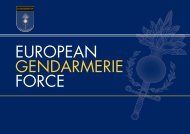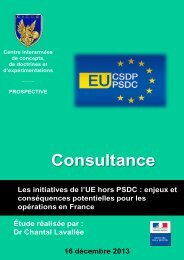Conference
science-research-bulletin-2013-conference
science-research-bulletin-2013-conference
You also want an ePaper? Increase the reach of your titles
YUMPU automatically turns print PDFs into web optimized ePapers that Google loves.
EUROPEAN POLICE SCIENCE AND RESEARCH BULLETIN<br />
SPECIAL CONFERENCE EDITION<br />
METHODS AND RESULTS<br />
For the purpose of this paper, we selected<br />
eight Central and Eastern European countries<br />
(Slovenia, Croatia, Bosnia and Herzegovina,<br />
Serbia, F.Y.R.O.M, Romania, Poland and Russia)<br />
and conducted a web-survey in the respondents’<br />
native language. The administration of the<br />
survey was organised by criminal law lecturers<br />
at Faculties of Law in all eight countries, and<br />
explores several issues related to the legitimacy<br />
of policing in young democracies in Central and<br />
Eastern Europe (post-communist countries). We<br />
used a survey previously used by Reisig, Tankebe,<br />
and Meško (2012), which was preliminarily<br />
tested and utilised on a sample of young adults in<br />
Slovenia in 2011. The survey was translated into<br />
the native languages of the studied countries,<br />
and the survey scales were preliminarily tested on<br />
samples of 50 students in each country. National<br />
research partners also presented the survey to<br />
students and discussed every item in the survey<br />
regarding their meaning and possible differences<br />
in the denotative and connotative meaning of<br />
the survey statements. After preliminary tests,<br />
the survey was published on the web and the<br />
students were given a certain period of time in<br />
which to complete the survey online. We also<br />
insured Internet access for all students in Faculties<br />
of Law in the respective countries. The survey<br />
was accessible only to law students who received<br />
a web address and a specific code provided by<br />
their criminal law lecturer.<br />
Using a convenience sample of law students<br />
(n=1 848) from Slovenia, Croatia, Bosnia and<br />
Herzegovina, Serbia, F.Y.R.O.M, Romania, Poland<br />
and Russia, a web survey was administered in the<br />
native languages of respondents in autumn 2012<br />
and spring 2013. Law students were selected due<br />
to the nature of their studies (legal orientation)<br />
and the assumption that they are planning<br />
to be future professionals in law enforcement<br />
or criminal justice agencies. For the purpose<br />
of this paper, we conducted analyses on a<br />
subsample of law students 18–25 years of age<br />
(n=1 689), consisting of male (n=514) and female<br />
respondents (n=1 175).<br />
The collected data were analysed using factor<br />
analysis, one-way analysis of variance and<br />
regression analysis. We compared trust in police<br />
and perceived legitimacy on policing and police<br />
in the respective countries, and presented only<br />
significant variables in the regression analysis<br />
tables.<br />
Table 1: Factor analysis<br />
Factors N M SD<br />
Legitimacy a (KMO = 0.718; α = 0.729) 1689 2.29 0.572<br />
Trust in Police a (KMO = 0.904; α = 0.874) 1689 2.31 0.611<br />
Cooperation b (KMO = 0.787; α = 0.752) 1689 3.19 0.635<br />
Police Authority a (KMO = 0.738; α = 0.819) 1689 2.04 0.592<br />
Procedural Justice a (KMO = 0.942; α = 0.906) 1689 2.24 0.546<br />
Distributive Justice a (KMO = 0.734; α = 0.712) 1689 2.18 0.565<br />
Police Effectiveness a (KMO = 0.847; α = 0.817) 1689 2.35 0.531<br />
1 — Strongly disagree … 4 — Strongly agree, b. 1 — Never … 4 — Frequently;<br />
KMO = Kaiser-Meyer-Olkin Test of sampling adequacy; α = Cronbach alpha (reliability)<br />
Factor analysis shows that the selected factors<br />
meet a minimum criterion for further analysis.<br />
Mean values show that all results imply lower<br />
values in legitimacy, trust, police authority,<br />
procedural justice, distributive justice and police<br />
effectiveness. The only factor which has a higher<br />
mean value is willingness to cooperate with the<br />
police (3.19); all other means are lower that<br />
2.35 on a four point-scale. For the purpose of<br />
this paper, a comparison of trust in police and<br />
perceived legitimacy of police and policing are<br />
compared in the studied countries (Table 2).<br />
77





